10.03.2023 (Caucasian Journal) As a result of a violent two-day standoff in downtown Tbilisi, the Georgian ruling party has withdrawn two controversial draft laws “on foreign influence” targeting foreign-funded NGOs and mass media, one of which has already been passed on first reading.
Today, Caucasian Journal publishes the opinions of some leaders of civil society organizations in Georgia, who were offered the following two questions asked by our journal:
Question 1 (Emotional): How would you summarize your feeling - after these days of standoff and their result?
Question 2 (Analytical): Do you envisage any changes now on the strategic level, or does this "laws story" have a tactical importance only?
Tinatin KHIDASHELI, Chairperson of Civic IDEA (Civic Initiative for Democratic and Euro-Atlantic Choice), former Minister of Defence of Georgia, Caucasian Journal's Board Member:
(Question 1) To me, these days were important for a particular reason. The actions of the people during the crisis proved that their devotion to the European cause was clear and resolute. My most important conclusion from the events of the last couple of days is that regardless of all the problems, all the impediments on our way to state-building, when it comes to the most sacred ideals, and most important issues of the final destination of Georgia people absolutely clearly speak: Georgia belongs to Western civilization, and there is no room for Russian alliances.
Nothing surprising about the government, we've seen it many times, and I believe you will see it again, but the important point is that people did not surrender. We have won the struggle, but the main fight is still ahead of us, the fight for the final victory over everything Russian and the semi-dictatorial ambitions of the shadow leadership of Georgia.
The actual goal behind the law is to marginalize civil society and all not aligned with them.
(Question 2) Unfortunately, I do not expect that the government learned its strategic lessons and is capable of drawing long-term conclusions from it either to make significant changes. My expectation is that they will continue with the same cynicism, provoking people and refusing substantial, result-bearing dialogue with the various groups of society. They will also try to realize the actual goal behind the law, which is to marginalize civil society and all not aligned with them. This is the reason behind their statement today about going into public with the explanation. Explanation means that they will try to use all propaganda machinery in their hand to stigmatize and marginalize everyone who might be problematic for them during the elections.
So, the most important is that opposition and civil society learn the lessons from the events of the last couple of days and make sure to capitalise the benefits it brought for the future of the country and use this energy, and protest for the preparation of 2024 victory over Russian agenda in Georgia.
(Question 1) The recent protests have shown a strong message to the whole world, that Europe remains the unequivocal choice of the Georgian people, and any deviation from the European vector will not be tolerated. The initiation of the Russian law by the ruling majority is a clear indicator of their intent to steer the nation towards Russia, where critical voices and opinions are replaced by silence.
The mobilization of our youth and students, their purpose-driven and resilient spirit, was a source of immense emotional elation and optimism for me. The entire society came out in defiance of the Russian way of life, culminating in a victory at this stage of the struggle.
The ruling party must remove the adoption of Russian laws from their agenda. Their credibility has been compromised due to repeated deceit, and the Georgian people and the global community no longer repose faith in their assurances.
(Question 2) It is imperative that we bring this matter to a close and dismantle all the artificial barriers that the authorities have created on the path towards obtaining EU candidate country status. Our strategic partners keep stressing that this law is incompatible with EU membership and shared values. The initiation of Russian laws has already inflicted considerable reputational damage to our efforts, as have the government's pronounced anti-Western rhetoric and actions taken in the wake of the Russian invasion of Ukraine. Any further discussion of the Russian law might only strengthen the anti-Western narratives.
Instances such as the unwarranted arrest of Nika Gvaramia, the director of a critical media outlet, only serve to compound the damage. As such, it is incumbent upon us to repair these fractures and work assiduously towards fulfilling the European Union's 12 points, in order to secure the well-deserved status for the Georgian people. Our strategy is laser-focused on achieving this objective.
(Question 1) I have developed the severe sense of injustice towards the civil society as well as international partners in a course of discussion of the draft law of Georgia on “Transparency of Foreign Influence” as well as its initial approval. Moreover, I think that it was an act of irresponsibility on the part of the parliamentary majority towards the future of the country. In addition, I felt disappointed with the fact that our numerous efforts to persuade the parliamentary majority to revoke its initiative was not met with the respective steps. However, I feel happy that youths with their consistency, patriotic spirit and aspirations gave me the hope and made me proud.
(Question 2) As far as the strategic dimension of the draft law is concerned, frankly speaking I do not expect any significant alterations with this regard. I will reiterate again, in case of particular interests, neither ruling nor other parties have enough resources to alter the declared pro-Western foreign policy objective of the country. Moreover, the cornerstone as well as the guarantor of realization of country’s pro-Western aspirations are civil society, media as well as opposition political spectra who are supportive to country’s Euro-Atlantic integration policy agenda.
Hereby it can be argued that there are two tactical objectives (importance) which the parliamentary majority seeks to accomplish by the adoption of the law. First, I think that in a course of implementation of EU 12 priorities (recommendations), the ruling party intends the creation and bring to the discussion table the high-profile theme, which can be eventually used as a subject for making compromise on one or some problematic recommendations. And the second, to cause serious reputational damage to civil society sector as well as adopt legal leverage to control their will. Fortunately, this plan has fallen apart. However, we face the long way to go and overcome many obstacles.
Fady ASLY, Chairman of the Board, International Chamber of Commerce (ICC Georgia), Special Representative of the Secretary-General for the Caucasus and Central Asia, International Chamber of Commerce:
(Question 1) I’m overwhelmed with pride and happiness to see those young people who took over the streets and who played a crucial role in pressurizing the government to revert that decision and cancel the law. For years now I have lost hope in the future of Georgia, can’t see Georgia going towards Russia, because of the policies of Georgian Dream and Bidzina Ivanisvili, and I was under the feeling that the youth themselves lost hope in their country, and they were leaving. And I discovered over past 2-3 days that the youth have taken their future in their own hands, and they have determined their future. This is an overwhelming feeling of joy and hope, and a thanks to those youth I regain confidence and hope in the future of Georgia.
Thanks to those youth I regain confidence and hope in the future of Georgia.
(Question 2) I believe it was a good lesson for Ivanishvili. He is very scared of the people, of the masses, because he understood that the masses have brought him to power, and they can remove him from power.
After the 20th of June 2019 when there was that Gavrilov Night, Ivanishvili panicked totally and he promised a change in legislation so the elections would be 100-percent proportional, and then he came back on his decision once thigs have calmed down. So I believe that people need to keep pressure on the government and the government needs to go by the power of the people, and that government must be more oriented towards the real interests of Georgia, and the long-term interest of Georgia is to be part of the European family and not part of the former Soviet Union under the aegis of Russia. So pressure needs to be kept, everyone is to play their role, people need to be vocal and brave.
Professor Murman MARGVELASHVILI, Director, Energy Studies, World Experience for Georgia (WEG); Associate Professor, Director of Energy and Sustainability, Institute at Ilia State University:
(Question 1) Excitement and hope for better future and not losing the chance of EU membership. A lot of work and potentially fight lays ahead though. The government is very clearly not up to the challenge.
This is a challenge for civil progressive society to rethink the situation, mobilize and continue the pressure in order to assure the goal of fulfilling the 12 recommendations of the EU and ultimately changing the ruling power peacefully through elections.
The Georgian Dream may have taken a tactical move to reduce the tension, regroup and mobilize own resources including their activists, pro-Russian, fundamentalist, nationalist and religious groups. It may still become nasty.
(Question 2) Though this is the first significant concession from this government, it is not over yet. The Georgian Dream may have taken a tactical move to reduce the tension, regroup and mobilize own resources including their activists, pro-Russian, fundamentalist, nationalist and religious groups. It may still become nasty.
On the emotional level, although Sadagi would not fall into “the agent” category, my feelings were a mixture of frustration and defiance.
On the analytical level, if such a law is adopted, it would have very negative consequences for Georgia in terms of civil liberties, business environment and demographics. I am not sure what exactly would Sadagi do. There was no time and willingness amongst us to accept such a dire possibility.
We were relieved to see the step back from the authorities. I hope it is a genuine decision and would be implemented soon.
(Question 1) The initiation of the law on foreign agents put under threat democracy and freedom in Georgia. The name of the law project was self-explanatory causing special painful memories in many of us familiar with the Soviet past or recent Russian history. None of the explanations could have justify the law that aims to marginalize and stigmatize civil society and media still having a voice in this country. I knew at that very moment that there was no way for me to register as a foreign agent in case the law is adopted and was delighted to hear the same approach from other civil society colleagues.
I would have never imagined that around 75 years later, after my grandpa was tortured in the NKVD prison, demanding him to sign a document acknowledging to be a foreign agent, I might have faced the attempt of being labeled the same way in the independent Georgia.
This, for me, was not only a betrayal of the future of Georgia, but of my ancestors as well. I would have never imagined that around 75 years later, after my grandpa was tortured in the NKVD prison, demanding him to sign a document acknowledging to be a foreign agent, I might have faced the attempt of being labeled the same way in the independent Georgia. This for me was more than an ordinary decision.
But we had to fight first for not making this happen and Georgian society showed solidarity, maturity and clear understanding of where does it belong and what this Russian-style legal threat meant for the future of our country - return to Russia. The law initiative introduced by so called “People’s Power” was countered by a real power coming from the people, from young generation who clearly stated that their future, future of Georgia is with Europe as this is the only way for Georgia to be truly independent, sovereign and democratic country.
What I feel now - I’m proud of Georgian people, who with their action have demonstrated to the whole world that Georgia is here, on a bright side of the history and neither the tear gas, or water cannons can change it.
(Question 2) This is clearly a tactical advancement. Hopefully all necessary concrete legal steps will be applied to turn the law down. As for the future development, hard to predict at this stage. We should look at what would be the trends – regarding the democratic development, whether serious steps are taken to get the candidate status. Also important is to see whether anti-Western rhetoric decreases. Until we see all of these, talks about strategic changes is immature. But what is of strategic importance for Georgia is that Georgian society clearly stated their will and that no concessions will be tolerated in exchange of their European choice.
(Question 1) Well of course the passage of the first hearing of the legislation was heartbreaking. GD has consolidated power over all state institutions, including the civil service, and chipped away at various facets of democratic governance, including the judiciary, elections, and parliamentary oversight. The opposition is weak and splintered and must compete on a tilted playing field where GD has the lion’s share of resources, including those of the state. The final check on the government is the vibrant and critical civil sector. Hence the new law.
It takes no more than a cursory review to note that countries that actually do have legislation similar to Georgia’s are not beacons of democracy and freedom: China, Russia, Azerbaijan, Saudi Arabia, and Bangladesh.
In my experience, the introduction of an NGO or media law is usually the last gasp of democracy. When I lived in Cambodia, the government of Prime Minister Hun Sen controlled all state institutions from top to bottom, manipulated electoral outcomes, and oversaw every financial transaction, legal or illegal, in the country. But the United Nations peacekeeper presence and reconstruction in the 1990s supported the development of an active civil society sector, which served as a critical watchdog and irritant for the government. The government tolerated this for years before finally deciding to remove this last threat to its power by introducing an NGO law extremely similar to the proposed Georgian one. It takes no more than a cursory review to note that countries that actually do have legislation similar to Georgia’s are not beacons of democracy and freedom: China, Russia, Azerbaijan, Saudi Arabia, and Bangladesh are counted in this group. It is also interesting to note when they have enacted such legislation, and it is usually toward the end of a long transition away from democracy.
Following the Georgian parliament’s passage, I was once again inspired by the Georgian people who took to the street to peacefully protest. As you know well, security agents have violently attacked them. This is sadly not surprising. It is the “order” side of the “law and order.” Another chapter right out of the autocrat’s playbook.
Following the Georgian parliament’s passage, I was once again inspired by the Georgian people who took to the street to peacefully protest. As you know well, security agents have violently attacked them. This is sadly not surprising. It is the “order” side of the “law and order.” Another chapter right out of the autocrat’s playbook.
It appears that with the recent announcement to cancel the law that this public mobilization worked, at least for now. But I would not hold my breath. It will be important for Georgians to keep the pressure on. It is clear that GD cares little about the international community any more, given the insults GD leaders hurl at EU MPs, American diplomats, NATO, so the pressure will need to come from within.
(Question 2) As I said, a NGO Law anywhere is a strategy – usually the last stop on the democracy decline track. It is to remove the last check on a government’s power. We seem to have pulled the emergency break, but as I said, it is not over. Georgian democrats need to continue to be strategic too. I have a feeling that many Georgians do not know much or care much about such a law, so it will be important to explain the consequences and why it matters to them and their lives. And how close Georgia came to losing its democracy. We often see robust activism in Tbilisi and presume the entire nation is equally enraged. This assumption is a mistake. Many Georgians still support Georgian Dream and its decisions, even if they are anti-Western, anti-democratic. Democracy needs to go on the offensive here.
Before answering the questions I would like to make a small introduction. Before the standoff days, the chairman of our organization – The Greens Movement of Georgia/Fiends of the Earth Georgia – Ms. Nino Chkhobadze, in a position of Chairperson of NGO Platform, actively participated together with Mr. Kakha Gogolashvili in the Parliamentary Committee hearings of the mentioned law and called for revoking, but, unfortunately, wasn't heard by the "lawmakers".
(Question 1) I would rather call it a victory and a kind of test for the Georgian society. I am proud of the young generation who have clearly stated, that they see the future of their country in Europe. These days have shown us the unity and solidarity of the Georgian people against the vague future of Georgia.
(Question 2) At this stage, it is difficult to foresee changes at the strategic level. Although recent events have shown that it was a big push. The public has made it clear to the government that Europe is the only choice of the Georgian people. Events were accelerated to some extent; for 8 months there were discussions about a Public Defender, and suddenly one day a high 2/3 of parliamentarians voted for a Public Defender, which is one of the 12 recommendations of the EU. This can also be seen as a possible prerequisite for positive change with active public oversight and solidarity.
(Question 1) The feeling is of relief and of long-awaited victory, obviously, but also of gratitude to the Georgian people to stand and fight for freedom and democracy. We're all happy to see that we still have the force and readiness to defend our values and it is especially important that the vanguard of this fight is the Georgian youth. We hope that our civil society will consolidate this victory and we'll be able to build on it. The struggle for democratization of Georgian society is ongoing and we know that we should get rid of Russian influence as soon as possible.
(Question 2) While the victory should be certainly celebrated we stay aware that the root causes of this long term crisis are pretty much unchanged. Georgian state institutions, legislative, executive, and judiciary branches of the government are plagued by the informal control of the oligarch Bidzina Ivanishvili. Georgia is a textbook case of State Capture: his control remains undisturbed and total. Anyone with a modicum of knowledge of Georgian politics knows that as long as this situation is unaltered there can't be a realistic expectation of real and consequential changes.
Even in the case of the "Russian Law" the aggressive pushback of the ruling party officials, the assessment of the situation by the government-controlled media and propaganda outlets leaves no doubt that the Georgian Dream does not even consider it as problematic. The only thing they so far admitted was "the lack of communication" with the society to better explain the purpose and the nature of this dangerous project. Moreover, as the voting results show, the ruling party did not reject the law: Georgian Dream MPs simply registered for a quorum and left the opposition's votes uncontested.
It should be noted that the campaign to adopt this repressive, undemocratic law was not an isolated incident. It is part of a broader pattern of stigmatization and marginalization of Georgian civil society, which represents one of the last roadblocks to the Russian-inspired oligarchic regime. As the 2024 elections approach, we expect the Georgian Dream to intensify its anti-Western and anti-liberal campaign, as any real democratic changes pose a threat to the very foundations of the Ivanishvili regime.
Obviously, in these conditions there is no expectation of strategic level shifts. The substantial changes are to be expected only after the state institutions and various government branches break free from informal control and influence of oligarch Bidzina Ivanishvili. While we continue our struggle for Georgia's democratic future, the strength of the forces we face and the resources at their disposal make it evident that we shall need robust and unwavering support from all friends of democracy.
(Question 1) Emotionally, these days were all-encompassing. They haven't finished yet. Although we went through all the stages of shock, particularly for me there was nothing unexpected that this government had nothing to do with Georgia's European integration, but still, it was a clear act of their removal of masks.
The dispersal of the rally began, and what happened on the square exceeded all the expectations of the townspeople; the strength that the young people showed was incredible, it was driven by pride, not anger towards the police special forces, who mercilessly dispersed the youth so that the deputies could return home safely after they pressed the button.
To see so many young people on the street with such emotionality and with such stamina, standing up for the defense of their country, is overflowing with pride and hope that everything will be fine in Georgia, and everything is just beginning, and we will definitely reach the goal we have been striving for for centuries.
(Question 2) The fact that the Georgian Dream retreated does not mean that people have reached the ultimate goal. The ruling party is famous for not keeping its word, their goal is to put out the fire, and then quietly do whatever they want. They always find loopholes to break their promises. The whole society opposes the so-called "Russian law". It kind of reminds me of June 19th, 2019. After that terrible so-called "Gavrilov night", where the young people lost their eyes, Georgian Dream promised that the next elections would be fully proportional. Though as soon as they learned that the protest had slowed down, they immediately withdrew their promise. So I would say that tactical success does not mean the final success in the war, we should be more awaken and I sincerely believe that Georgian citizens finally will triumph over that major war that names Georgia's final merger into the Western family.
Zaza BIBILASHVILI, Founder, Chavchavadze Center for European Studies and Civic Education; Senior Partner, BGI law firm; Caucasian Journal's Board Member:
(Question 1) First and foremost, I am very proud of my people. I feel proud to be Georgian, and proud to see so many bright young people fight for their own and their country’s democratic future…
I also have a feeling that the regime has retreated tactically but has not changed its original goals, which was to consolidate its grip on power in a Russian style, silencing critics by introducing an authoritarian law modelled after Putin’s analogous statute and cynically branding as an “American law”.
We are no longer in the realm of mere differences in opinion. We face a choice between basic common sense and Russian-style autocracy, wrapped by Orwellian propaganda and daily disinformation.
Thus, the sense of relief and accomplishment which most Georgians had after the bill was recalled under great internal and international pressure is temporary. We have no right and no reason to relax. The cunning way in which the bill was introduced as well as the determination with which it was pushed by the ruling majority leaves no room to second guess their motives.
Moreover, since the peak of the crisis earlier this month, the regime’s rhetoric has gotten ever more venomous and anti-Western, with its messages fully in line with traditional Russian propaganda lies, branding opponents with labels such as “liberal fascists” and invoking the ghost of the “global war party” (which includes pretty much everyone but Russia and its satellites).
We are no longer in the realm of mere differences in opinion. We face a clear choice between basic common sense and Russian-style autocracy, wrapped by Orwellian propaganda and daily disinformation. GD have shown that their goals are incompatible with the historic choice of the Georgian people. They have already thus lost moral and political legitimacy. It is no surprise that Georgia’s enemies like Lavrov, Zakharova, Karasin, Solovyov and Simonian have all been singing accolades to the leaders of Georgian Dream, including PM Gharibashvili. All of this makes it clear that it would be nearly impossible to find compromise with those money and power-hungry people who have put their personal well-being ahead of the country’s vital interests.
(Question 2) GD have very good tactical advisors. If we look at last several election cycles, they have been very flexible and able to adapt to evolving political challenges. Yet, now that they have been outed as an openly pro-Russian regime, their problem is greater than ever before. Their credibility, inside and outside of Georgia, is at a historic low point. That said, with the political opposition being disorganized, underfunded and often lacking chemistry with voters, GD still have a chance to turn this around, even at the expense of forfeiting Georgia’s European future. Thus, we must be vigilant. Nothing is over until the country is once again run by a pro-Western government guided by national interests and Georgia is once again reunited with the friends GD has managed to alienate over the years.



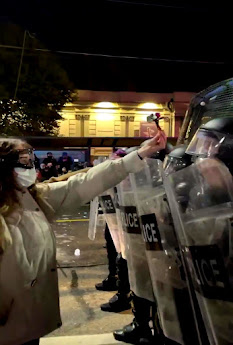
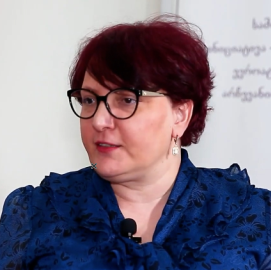

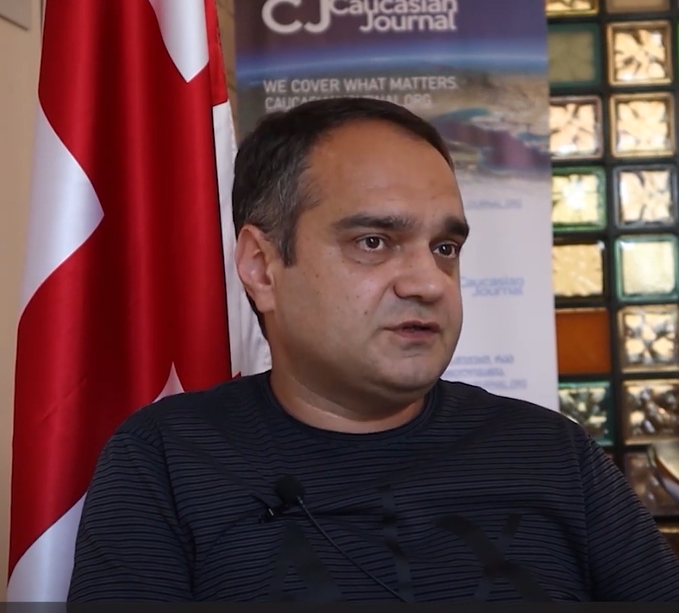


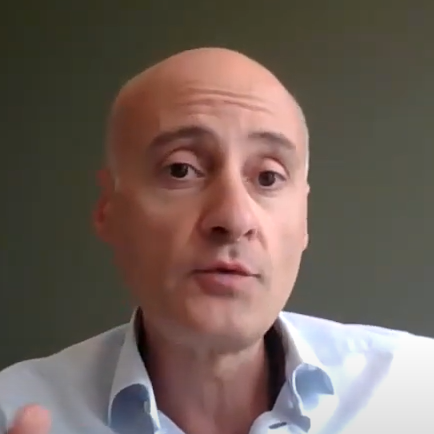

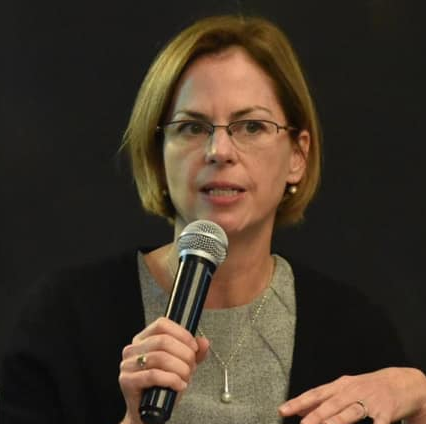

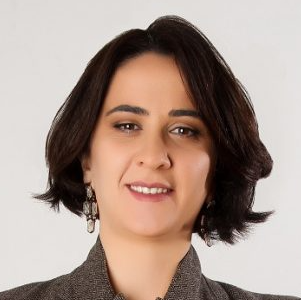


No comments:
Post a Comment